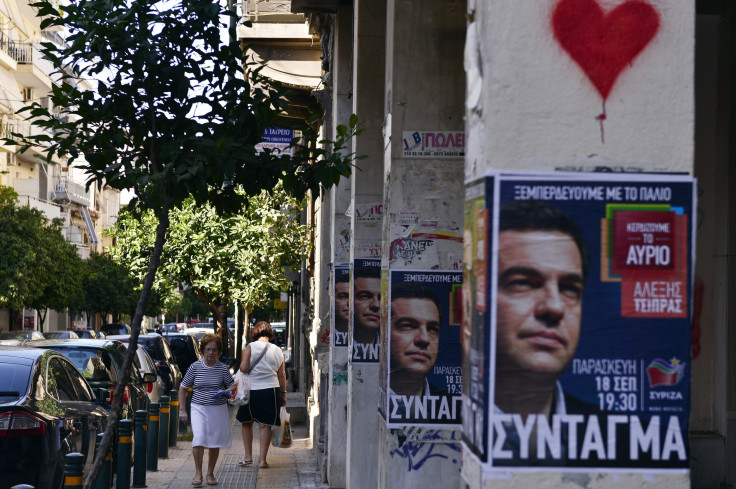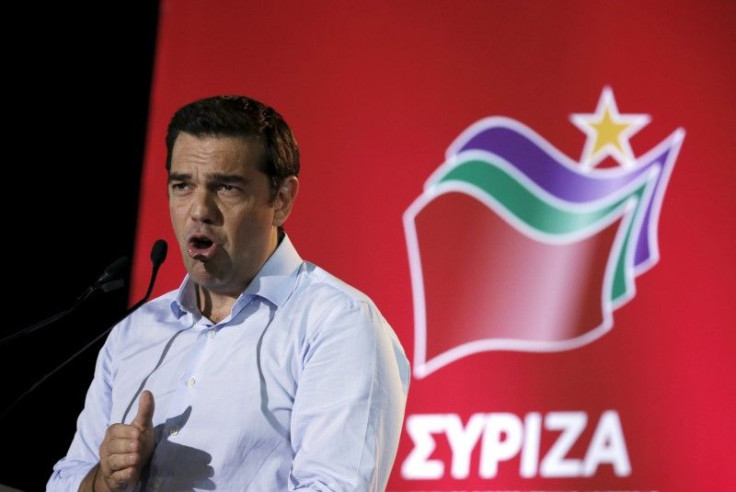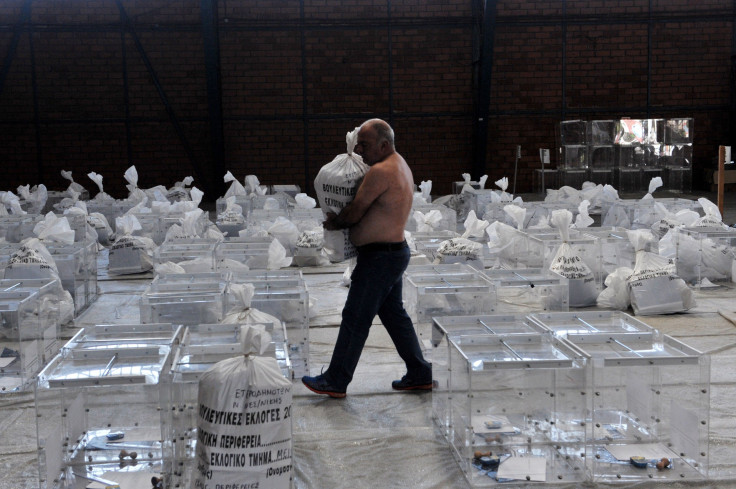Greek Snap Elections 2015: Amid Continuing Debt, Tsipras Failures, Greeks To Decide Nation's Leadership

Nearly two months after banks in Greece reopened to long queues and fiscal anxieties, Greek citizens were still struggling under the weight of capital controls, with average people consuming less as the economy contracted. As voters head into this weekend’s snap elections, the top issue has been what the future holds for the Greek economy.
Voters there are set to take to the polls Sunday to elect a new parliament. Those elections will, in turn, decide who becomes the prime minister. The elections were triggered after former Greek Prime Minister Alexis Tsipras resigned in August amid continuing economic instability in the debt-ridden nation and splintering within his own Syriza party. With the two main political parties neck and neck in the polls, economic concerns continue to dominate the debate that will decide the future of Greece and have major consequences for the 19 eurozone countries.
“These elections are important because they will either pave the way for stability or political instability in the country,” said Julian Rappold, the acting head of the German Council on Foreign Relations, a think tank that studies international affairs. Greek politics have been incredibly volatile since the 2008 recession that crippled its economy and sent unemployment sky high. With six general elections over six years and two in the past eight months alone, the uncertainty of Greece’s future is reflected in the chaotic politics of Athens.
Tspiras was elected on an anti-austerity platform in January that opposed measures such as reduced social spending and higher taxes in exchange for bailouts from the European Central Bank, the European Commission and the International Monetary Fund. After holding a referendum in July on whether to accept a new bailout package that would include even stricter austerity, Tsipras accepted a third bailout despite a resounding "no" vote from Greeks, who had supported Tsipras but said they felt betrayed. The prime minister eventually resigned in August as party members increasingly turned against him.
The third bailout led to capital controls, such as high transaction taxes and tight restrictions on bank withdrawals. Greeks in Athens could withdraw no more than 60 euros a week, and on some of the smaller islands in Greece, residents were not allowed to take out more than 30 euros ($33.90) a week from their banks, either through a teller or from an ATM.

Syriza's Star Fading?
Syriza is hoping to win outright or form a majority coalition; if that happens, Tsipras, as the head of his party (or coalition) could again be appointed prime minister. Syriza's main competitor is the center-right, pro-Europe New Democracy party, which held power before Syriza, and its leader is Evangelos Meimarakis. Support for the two parties was almost completely tied in recent weeks, as Syriza secured a minor lead with 26.5 percent of support, with New Democracy only one percentage point behind at 25.5 percent, Bloomberg news reported Monday.
Syriza's popularity has taken major hits since the party won the general elections in January, and many of his supporters have lost faith in his ability to govern as he made large concessions to European lenders throughout the summer. As many as 20 percent of Greeks will abstain from the vote Sunday, and a disproportionate number of them were former Syriza supporters, the Wall Street Journal reported Wednesday.
“The power of Tsipras is not the same as it was,” said Janis Emmanouilidis, a Greek political analyst for the European Policy Center, an independent think tank studying European affairs. Syriza could still win. However, “Many people think going back to the old establishment, which New Democracy represents, is not a good option either,” Emmanouilidis added.
It's the final week of Greece election campaigning - and it's too close to call http://t.co/Z85b6gaxhJ pic.twitter.com/3t1aokNEgE
— Bloomberg Business (@business) September 14, 2015Putting Economy First: The End Of Anti-Austerity?
Fiscal plans have dominated debate in Greece, and experts agree that the main question will be which party can ensure stability for a Greek populace that is still struggling under capital controls. Though most people in Greece can now afford groceries, Greeks can still only withdraw 420 euros a week from their banks, and most of that money is going to basic needs, not stimulating the economy through discretionary consumption, economists said.
Unemployment dipped slightly in September to 24.6 percent, the Associated Press reported Thursday. Still, that figure means that nearly one out of four people is jobless, with that number jumping to one out of two for Greeks aged 18 to 24.
Despite the burden of capital controls, anti-austerity has all but disappeared from Greek political rhetoric, with both main parties promising to adhere to bailout terms. Even Syriza, which rose to power on an anti-austerity platform, has been backed into a corner by European lenders, fearing the financial agony that a default could mean for the country. “The previous Tsipras government agreed to an extremely tight corset in regard to debt," said Rappold of the German Council on Foreign Relations. “They do not have lots of potential to really shape policies; it’s rather actually who can administer the reforms.”
Only fringe parties, including the far-right Golden Dawn, have continued along anti-austerity lines. Golden Dawn, which has often been called the neo-Nazi party of Greece, could win as much as 10 percent of the vote by sticking to anti-austerity lines, analysts said. The party's anti-immigration stance has also resonated increasingly with exasperated Greeks who are at the center of an ongoing refugee crisis.
More than 160,000 refugees have arrived on Greece's Aegean islands since January, and the cost of caring for so many people has put a strain on the Greek budget. Though less discussed in the local political arena than the future of the nation’s economy, the refugee crisis could play a role in electing far-right members of parliament. “The refugee crisis doesn’t seem to register a lot in the campaign or in the media,” said Angelos Chryssogelos, a Greek foreign policy expert, adding “the basic litmus test of that will be the performance of the Golden Dawn.”

Citizens and analysts alike have called for stability above all. Unity in government and adherence to the current bailout are the only path out of debt in Greece, according to Zsolt Darvas, an economist specializing in European Union policy. “I’m more optimistic about the future of the Greek economy,” he said in an interview Thursday, saying that the Greek economy could show growth in as little as six months, if the right leadership is in office.
The rest of the eurozone will be watching with great interest, especially leaders in countries such as Germany that are major lenders to Greece and want to see the new government adhere to the terms of the bailout. “I sense that the blame game [on European lenders] is coming to an end,” said Judy Dempsey, a foreign policy analyst based in Berlin. “It’s time really to close this old chapter and start a new one,” she said.
© Copyright IBTimes 2024. All rights reserved.












